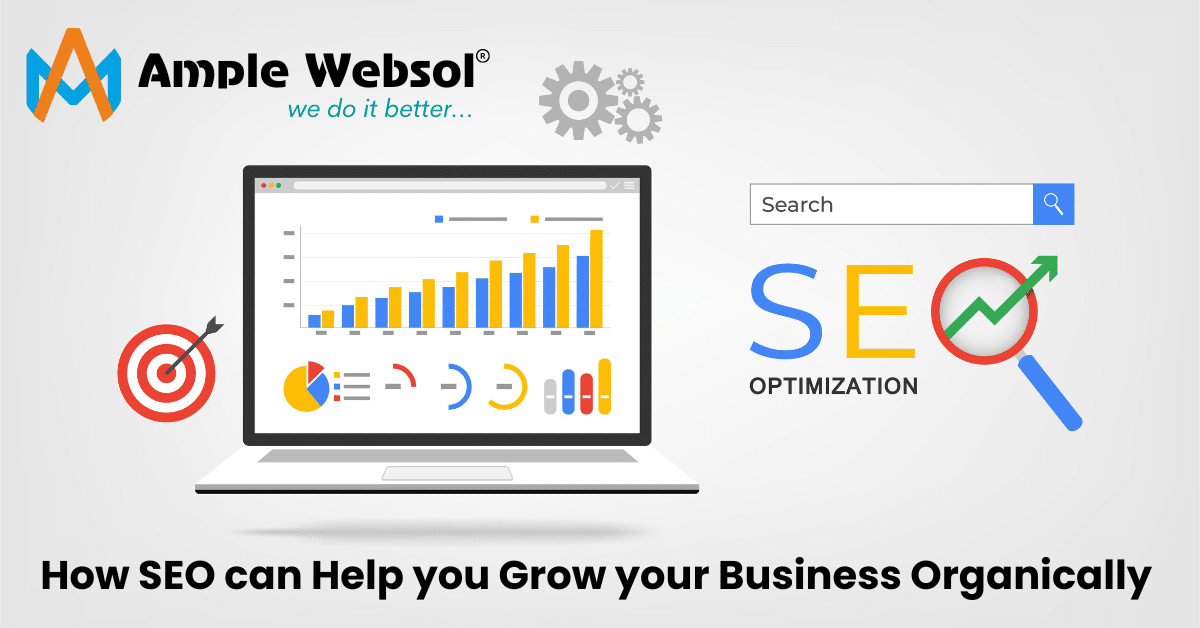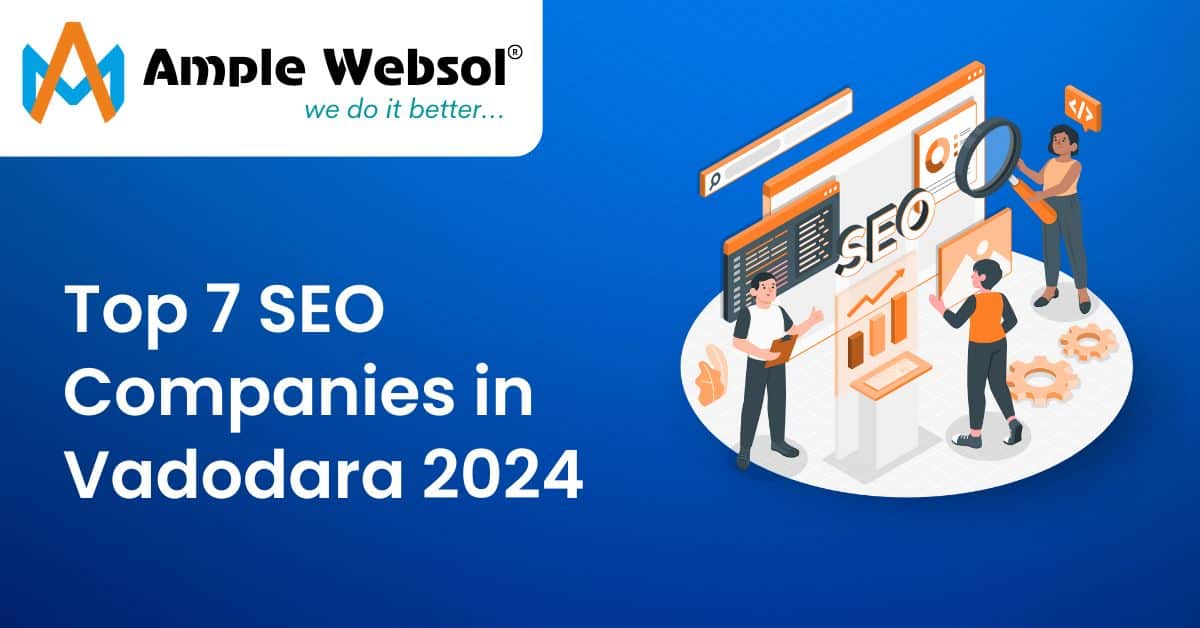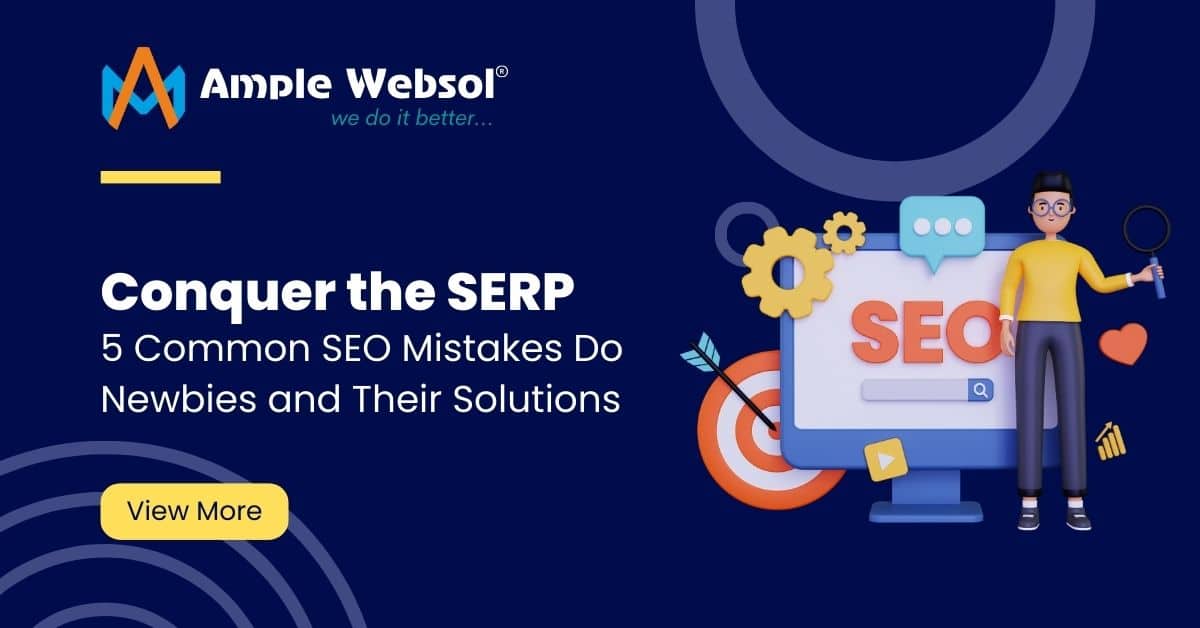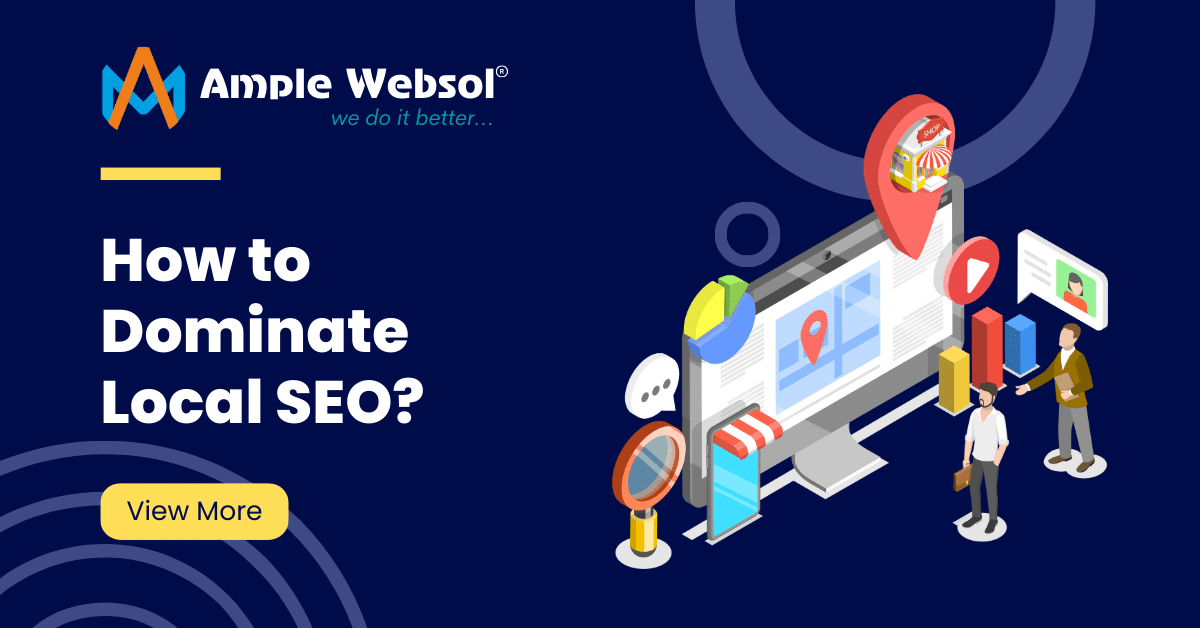In the digital age, the success of any business heavily relies on its online visibility.…

How SEO can Help you Grow your Business Organically
How SEO (Search Engine Optimization) can Help you Grow your Business Organically
Have you ever wondered how search engines like Google or Bing know which websites to show you when you’re looking for something online?
Well, here SEO plays a significant role in this part. SEO stands for Search Engine Optimization, it is responsible for your company to rank higher in search engines like Google, Bing, Yahoo, etc. Whether you offer:
- Any Services,
- Sell Any Products,
- Informational Content, etc.
SEO ensures that people looking for what you offer can easily find you. It’s all about connecting you with the right audience and giving your business greater exposure.
SEO or Search Engine Optimization is like the roadmap to make your website more visible on the search engine and be top on the searches. It helps your website to show up higher when people search for things on Search Engines.
In this Guide you’ll Learn Following Points: ·
Why is SEO Important?
SEO (Search Engine Optimization) is the backbone for online visibility and getting more reach organically. It’s more than just improving your website’s ranking; it’s a strategic optimization of your digital presence to:
- Attract targeted traffic that’s relevant to your business,
- Create a better experience for users navigating your website,
- Drive conversions (sales, leads, etc.) and overall business success.
The importance of SEO is supported by facts and industry experts. It is an important technical aspect of your online presence that can significantly impact your visibility, traffic, and revenue generation.
According to the Insights Given by Insider Intelligence, it has been shown that 57% of Online Shoppers Start their Product Search on Amazon followed by
- 42% on Search Engines Like Google, Bing
- 39% on Walmart
- 23% on YouTube
- 21% on Facebook
- 18% on Instagram
- 17% on TikTok
Also, Website which is properly optimized, and which is SEO Friendly Increases Visibility & Traffic, Credibility and Trust, Gives Competitive Advantage over other Websites.
SEO is really important because when you search for something online, there’s a lot going on in those search results.
SEO plays a significant role as there is intense competition on Search Engine Results Pages (SERPs), which are packed with various search features along with PPC ads. These SERP features contains:
- Knowledge Panels
- Featured Snippets
- Maps
- Images
- Videos
- Top Stories (News)
- People Also Ask
- Carousels (Web Stories)
SEO acts as a Pathway, which brings the right kind of Visitors to help you reach your Objectives Such as Conversions, Visits, Sales, etc. Additionally, it adds trust, when your website ranks high, it’s Credibility and Trust Increases which results into more people visiting your website, eventually Ranking higher on Search Engines like Google, Bing, Yahoo, etc.
SEO Types
Mainly There are 3 Types of SEO:
1. On-Page SEO: It majorly focuses on optimizing individual web pages to rank higher and get more traffic from Search Engine.
2. Off-Page SEO: It majorly focuses on improving Website’s Authority, Relevance and Trustworthiness through Activities performed outside the website itself.
3. Technical SEO: It majorly focuses on optimizing the technical aspects of a website like improving its Crawlability, Indexability and its overall Performance.
Let’s Understand Each of the Following In-Depth
On-Page SEO
On-Page SEO is considered as giving your website a makeover to make it more appealing to search engines like Google, Bing, etc. It’s about improving individual web page, so they rank higher when People Search for the content Online.
On-Page SEO mainly involves:
- Keywords
- Content Quality & Relevance
- HTML Tags Optimization
- URL Structure and Internal Linking
- User Experience (UX) Optimization
- Technical Optimization
- Keywords
On-Page SEO always begins with Keyword Research to identify Relevant Search Terms & Phrases which are related to the Web-Page Content and the Targeted Audience. Keywords are like the Key to Make it to the top in Search Engines.
Keywords should be incorporated strategically into important On-page Elements such as Page Titles, Meta Descriptions, Headings, Sub-headings and Body Content to give the Green Signal to Search Engines.
Content Quality & Relevance
High Quality & Relevant Quality is key for On-Page SEO. Content should be Well-Written, Informative, and Engaging enough to provide User with all his/her answers and provide them with values.
Content Optimization involves Structuring the Content for proper Readability, Using Semantic Markup, and Incorporating Relevant Keywords naturally within the context of the Content.
HTML Tags Optimization
HTML Tags play a significant role in On-Page SEO by providing Structures Data to Search Engines and Eventually Affecting How Pages are Displayed in Search Results.
Key HTML Tags include Title Tags, Meta Descriptions, Heading Tags (H1, H2, H3, etc.), Image Alt Attributes, and Canonical Tags which should be optimized for Relevant Keywords and Descriptive Information.
URL Structure and Internal Linking
Optimizing URL Structure involves making proper Descriptive and User-Friendly URLs that relates with relevant keywords and can be effectively used to reflect the content of the Page.
Internal Linking helps in distributing Links Equity and Establishing Hierarchical Relationships between Pages, which Improves Crawlability and Navigation for Both Users and Search Engine Bots.
User Experience (UX) Optimization
User Experience is also considered as one of the key Ranking Factor in On-Page SEO. Websites should be always designed keeping in mind Usability, Accessibility, and Mobile Responsiveness to provide a Positive Experience to Users/Visitors.
Factors like Page Speed, Mobile Friendliness, Easy Navigation and Clear Call-To-Actions (CTAs) always improve User Experience & Gives a Better Search Engine Ranking.
Technical Optimization
Technical aspects of On-Page SEO also involve Optimizing Underlying Code and Server Configurations for Improving Website Performance and Accessibility for Search Engines.
This Includes Implementing Structured Data Markup, optimizing robots.txt and XML Sitemaps, improving site speed and Performance, and Addressing Technical Issues such as Broken Links and Crawl Errors.
In Brief, we can say that On-Page SEO contains a Range of Technical Optimization Techniques which aims to Improve Individual Web Page Search Visibility, Relevance and User Experience. By Optimizing On-Page Elements like Content Quality, HTML Tags, URL Structure, Internal Linking and Technical Aspects. Websites can easily Achieve a Good Search Engine Ranking and Attract a Good Amount of Organic Traffic.
Off-Page SEO
Off-Page SEO refers to the Strategies and Techniques which we Implement outside our website to Improve its Authority, Relevance and Reputation for Search Engines which eventually Results in Ranking Higher on Search Engines Pages.
Important Factors to be considered in Off-Page SEO are:
- Link Building
- Social Media Engagement
- Local SEO
- Influencer Marketing
- Content Promotion
Link Building
Link Building mainly includes acquiring Backlinks from External Websites to your own website. Backlinks are like “Votes of Confidence” from other websites, which indicates Search Engines that your website is Credible and Trustworthy.
There are many Strategies for Link Building which includes Outreach to Relevant Websites, Guest Blogging, Creating Shareable Content, Participating in Forums and Communities, and Leveraging Social Media Platforms to Attract Backlinks.
Social Media Engagement
Social Media Engagement involves actively participating in social media platforms to Promote your Website, Share Website Related Content, and Interact with your Audience.
In Social Media Engagement, apart from Sharing Content, there are many Social Signals such as Likes, Shares, Comments, Repost, Brand Mentions, etc. which also Contributes to building Website’s Authority and Visibility in Search Engines. With that social media also Serves as a Channel to Share and promote your Product/ Service which helps you to reach broader Audiences.
Local SEO
Local SEO solely focuses on optimizing your website to Appear in Local Search Results and Attract Local Customers from Selected Area.
To Rank Higher in Local Search Results, there are some Strategies which involves Optimizing Google My Business Listings, Obtaining Positive Reviews from Local Customers, Add Proper Details like Business Name, Address, and Phone Number in
Local Directories which helps in building Authority and Lastly Creating Location-Specific Content can also Help us in improve Rank in Local SEO.
Influencer Marketing
Influencer Marketing mainly Involves Collaborating with Influencers, Bloggers, and Industry Experts to promote your Website and Content to their Set of Audience.
In Influencer Marketing it is beneficial to build Website Trust in the mind of Audience as Influencer have established Credibility and Authority in their Niche, and their Endorsements can help Website to Drive Traffic, Build Brand Awareness, and Attract New Audiences to Our Website. Using Influencer Marketing we can expand the reach can be an effective strategy for expanding your reach and earning valuable endorsements from trusted sources.
Content Promotion
From the word itself we can understand that it involves constantly promoting your Website’s Content or any Content which can be related to Website to various Online Channels which will eventually help to Increase Visibility, Attract Traffic and Earn Backlink which will be helpful in building Domain Authority.
There are many Strategies in which we can Promote our Content to various other Websites or any Content Sharing Platforms. The Strategies which we use includes Sharing Content on Social Media Platforms, Submitting Guest Posts to Relevant websites, Participating in Online Communities and Forums, with all we can share our Content through different channels such as Email Marketing or by creating outreach campaigns which will help to reach Influencers or any Potential Collaborator.
In Brief, we can say that Off-Page SEO packs a range of Strategies and Techniques which are aimed to building Website’s Authority, Relevance and Reputation across External Online Channels. By Focusing on Linking, Social Media Engagement, Local SEO, Influencer Marketing and Content Promotion, we can enhance our Website’s Visibility, Credibility and be Top on Charts in Search Engine Rankings.
Technical SEO
Technical SEO refers to the optimization and improvements from the Technical Aspects of a Website to Improve its Crawlability, Indexability, and Overall Performance in improvement of Search Engine Rankings. It solely focuses on ensuring that search engine bots can Efficiently Crawl & Index our Website Content, and the Website is technically sound and Accessible to Both Users and Search Engines.
The Key Aspects which we need to keep in mind are as follows:
- Website Structure & Navigation
- Site Speed Optimization
- Mobile Responsiveness
- Structured Data Markup
- URL Parameters & Canonicalization
- Robots.txt & XML Sitemaps
- HTTPS & Security
Website Structure & Navigation
Technical SEO mainly involves optimizing the Website’s Structure and Navigation to ensure easy navigation for Users and Search Engine Bots.
In Website Structure & Navigation it majorly includes Organizing Content into Logical Categories, Using Proper Descriptive URLs, Implementing Breadcrumb Navigation, and Creating an XML Sitemap which guides Search Engine Crawlers Through Website’s Hierarchy in an easy and simple manner.
Site Speed Optimization
Site Speed Optimization solely focuses on Improving Website Loading Times to increase User Experience and Search Engine Rankings.
In Site Speed Optimization we mainly include Reducing Server Response Times, Optimizing Code and File Sizes, Leveraging Browser Caching, and Reducing Page Load Times Through Different Techniques such as Image Optimization and Lazy Loading. By optimizing Site Speed, we can Increase User Experience on our Website which can eventually Increase our Website’s Ranking in Search Engines.
Mobile Responsiveness
Nowadays with the Increasing Number of Mobile Devices, it is important from User Perspective to be able to be access the website across multiple devices, so in Technical SEO we ensure that the Website is Mobile-Friendly and Responsive across Different Screen Size and Devices.
In this we involve using Responsive Web Design Techniques, Optimizing Viewport Settings, and Testing the Website’s Mobile Usability to ensure a Seamless Experience for Mobile Users.
Structured Data Markup
Structured Data Markup involves Adding Markup to Website Content using schema.org Vocabulary to help Search Engines Properly Understand and Interpret the Content more Effectively.
This Includes Implementing Structured Data Markup for Rich Snippets, Featured Snippets, Knowledge Panels, and Other Enhanced Search Results Features which will help to improve Visibility and Click-Through Rates in Search Engines Results.
URL Parameters & Canonicalization
Technical SEO involves managing URL Parameters effectively to Prevent Duplicate Content Indexing and Ensure Efficient Crawling and Indexing of Website Pages.
Canonicalization refers to specifying the preferred version of a URL to avoid Duplicate content issues and consolidate link equity.
Robots.txt & XML Sitemaps
Technical SEO also includes managing the robots.txt file to control search engine bot to access selected or particular pages of website and directories.
It also involves creating and maintaining XML sitemaps to provide search engines with a comprehensive list of website URLs for crawling and indexing purposes.
HTTPS & Security
Nowadays as security is gradually becoming a priority for search engines, Technical SEO also includes implementing HTTPS encryption to secure our website communication and protect user data.
This involves obtaining an SSL Certificate, configuring server settings for HTTPS, and ensuring secure connections throughout the website.
In Brief, we can say that Technical SEO focuses on optimizing the Technical Infrastructure of a Website to Enhance its Crawlability, Indexability, and enhance the User Experience. By Addressing all the Technical Key Aspects Such as Website Structure, Speed, Mobile-Friendliness, Structured Data Markup, Canonicalization, and Security, Websites can improve their Search Engine Rankings and Provide a Better Experience to End Users and Search Engine Bots.
Conclusion
After Understanding the Whole Scenario, we can Say that SEO can be your Business’s Best Friend during the Initial Growing Periods. It is not just about Changing the Website’s Content in any Manner to Just Grow the Ranking by any means in Search Engine Ranking, It’s About taking your Time to create a Pathway for Expansion in an Organic way and Making a Meaningful Connection with our Audience.
SEO is not something you do once and forget it, It’s like a journey that keeps going on. Also, with the Changes in Search Engine Rules and Trends, your SEO Strategy should change with that. It’s all about being Flexible, staying on Top of Things, and always delivering what your audience needs.
If the whole SEO Concept is looking Complicated for you, Don’t Worry Ample Websol is here to help you out. We offer bunch of Services that can help Grow your Business and take it to the Next Level, we our Proven Track Records and our Professional Team, you can Trust us to help your business grow online.
In the end, SEO isn’t just about making your business bigger. It’s about taking care of it, helping it grow naturally, and setting it up for success in the long run. So, don’t be afraid to dive into SEO. Team up with Ample Websol and get ready to see your Business Growth in this Online World!
FAQ’s
What is the Goal of SEO?
– The primary goal of SEO (Search Engine Optimization) is to increase a website’s visibility and ranking on search engine results pages (SERPs) for relevant keywords and queries. By optimizing various aspects of a website, such as content, structure, and technical elements, SEO aims to attract targeted organic traffic, improve user experience, and drive conversions and business success. The goal of SEO is to ensure that a website appears prominently in search engine results when users are seeking information, products, or services related to its offerings.
Why is SEO important for businesses?
– SEO is Crucial for Businesses as it helps them to Attract Targeted Traffic, create a Better User Experience, and Drive Conversions. It enhances Online Visibility, Credibility, and Trust, Ultimately Leading to increased Traffic and Revenue Generation.
Are Backlinks important for SEO?
– Yes, Backlinks are important for SEO. They are like “Votes of Confidence” from other websites, indicating to search engines that your website is credible and trustworthy. Quality backlinks from reputable sources can improve your website’s authority and trustworthiness, leading to higher rankings in Search Engine Results Pages (SERPs).
– You can share content on various platforms to effectively boost your rank in search engines. Some effective channels include Social Media Platforms (Facebook, Instagram, LinkedIn), Content Sharing Sites (Quora, Medium, Flipboard), Industry-Specific Forums and Communities, Guest Blogging, Email Marketing, etc. By Leveraging these Channels Effectively, you can boost your content’s visibility, attract more traffic, and improve your rankings in search engine results pages.
How can Ample Websol help with SEO?
– Ample Websol offers a range of services to help businesses grow online, including SEO. With their Proven Track Record and Professional Team, they can assist in Optimizing your Website for Better Visibility, Traffic, and Online Growth. They Provide Customised Solutions to meet your Business needs and Help you Achieve Success in the Digital World.
Explore our Services!
Website Development Company in Vadodara, Digital Marketing Company in Vadodara, SEO Company in Vadodara, Google Ads Expert in Vadodara, Hire the Best Facebook Ads Specialist in Vadodara, E-Commerce Development Company in Vadodara, UI/UX Design & Development Service in Vadodara, Web Application Development Services in Vadodara, Mobile Application Development Services, Social Media Marketing Agency in Vadodara, Best Email Marketing Services in Vadodara


